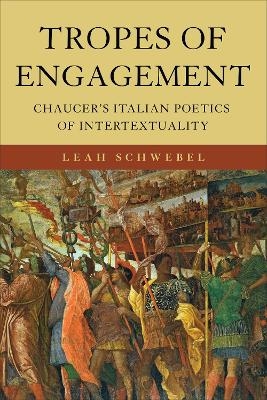
Tropes of Engagement
University of Toronto Press (Verlag)
978-1-4875-5260-2 (ISBN)
While scholars have long explored connections between Chaucer and Boccaccio, relatively few have asked why Chaucer makes such a habit of obscuring the influence of his favourite vernacular author. Tropes of Engagement asks the question of what motivated Chaucer to camouflage his debt to his most prominent, yet never named, Italian source: Giovanni Boccaccio.
Leah Schwebel boldly claims that when Chaucer erases Boccaccio, he is mimicking strategies of translation practiced by his classical and continental predecessors. Tracing popular narratives from antiquity to the late Middle Ages, including the Knight’s Tale, the Clerk’s Tale, the Monk’s Tale, Troilus and Criseyde, and Lydgate’s Fall of Princes and Troy Book, Schwebel argues that authorial erasure, invention, and manipulation are recognizable literary tropes of engagement that poets employ to suggest their connection to, and place within, a broader authorial tradition.
Combining an attention to the cultural, historical, and material circumstances surrounding literary production with a mode of source study that looks beyond discernable influence, Tropes of Engagement recognizes authors self-consciously erasing and misreading each other as part of a process of mutual and self-promotion.
Leah Schwebel is an associate professor of English at Texas State University.
Abbreviations
Acknowledgments
Introduction
Source Study and Its Critics
Classical Studies of Intertextuality
Retelling “Olde Stories”: Chaucer’s Boccaccian Poetics
1. Literary Patricide in The Legend of Thebes
Following in the Footsteps of Virgil from the Thebaid to the Teseida
I will be the First to Sing what has been Sung Before: Revolutions of Primacy in Antique Poetry
A Tradition of Fingere in the Teseida and the Genealogie Deorum Gentilium
The Silenced Author of Chaucer’s Knight’s Tale
Go, Little Quire
2. Restoration through Translation in the Clerk’s Tale
Dressing Griselda: Boccaccio’s Decameron and Its Dantean Roots
Undressing Griselda: Petrarch’s Historia Griseldis
Redressing Griselda: Chaucer’s Translation of Petrarch
3. Power in Flux: Chaucer’s Triumphal Monk’s Tale
Poetic Glory in the De casibus virorum illustrium
Before the Falls: The Roman Triumph, Tropea, and a Tradition of Triumphal Poetry
Boccaccio’s Triumphal Poetics: The Amorosa visione, Textual Monument
Chaucer’s Eternal Monk’s Tale
4. Myn Auctor Lollius: Chaucer and the Invention of Troy
Dynastic Fraudulence in the Troy Story: The Roman de Troie
Truth and Fiction in the Filostrato
Authority and Invention in Troilus and Criseyde
5. Chaucer through the Looking Glass: Lydgate’s Chaucerian Poetics
Lineage and Legitimacy in the Troy Book
Lydgate’s Bochas and Chaucer’s Fall of Princes
Notes
Bibliography
Index
| Erscheinungsdatum | 05.01.2024 |
|---|---|
| Verlagsort | Toronto |
| Sprache | englisch |
| Maße | 159 x 235 mm |
| Gewicht | 580 g |
| Themenwelt | Literatur ► Anthologien |
| Geisteswissenschaften ► Sprach- / Literaturwissenschaft ► Anglistik / Amerikanistik | |
| Geisteswissenschaften ► Sprach- / Literaturwissenschaft ► Literaturwissenschaft | |
| ISBN-10 | 1-4875-5260-2 / 1487552602 |
| ISBN-13 | 978-1-4875-5260-2 / 9781487552602 |
| Zustand | Neuware |
| Informationen gemäß Produktsicherheitsverordnung (GPSR) | |
| Haben Sie eine Frage zum Produkt? |
aus dem Bereich


